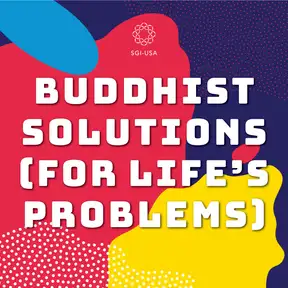A Buddhist Perspective on Mental Health
Today’s episode is about mental health, which was one of our most requested topics of the year. Because there’s so much to cover, it’s divided into four parts, which you can listen to all at once, or you can check the show notes for time stamps to skip to the section that most resonates with you, though they are best understood in total.
Today’s episode is about mental health, which was one of our most requested topics of the year. Because there’s so much to cover, it’s divided into four parts, which you can listen to all at once, or you can check the show notes for time stamps to skip to the section that most resonates with you, though they are best understood in total.
Part 1 (4:33)
We discuss what the Buddhist definition of health is and how we’re defining mental health on this episode, through a conversation with two mental health professionals who happen to also practice SGI Nichiren Buddhism, therapist Mindy Milam and psychiatrist Bora Colak. Both have different backgrounds in the mental health field and were able to share some insight on the parallels they see between their personal Buddhist practice and their professional experiences in the field of mental health.
Part 2 (20:55)
We hear the incredible story of a young woman named Yuko Miyama about her own mental health struggles, specifically with PTSD and depression.
Part 3 (37:42)
We talk to Maya Gunaseharan, Young Women’s Leader of SGI-USA about what the Buddhist perspective on mental health is, and what it takes to care for someone, whether it’s a loved one or someone in your community who is struggling with a serious mental health issue.
Part 4 (46:15)
Ten concrete takeaways from the episode, based on Buddhist wisdom, if you are currently struggling with your mental health. It’s important to note that this looks different for everybody and Buddhism is reason, meaning it's extremely important to seek out professional help if you feel that is what you need. Buddhism is not an alternative to mental health support but instead a way to help you believe in yourself and manifest the wisdom and courage required to fight for your health and be the best version of you that you can be.
Part 1 (4:33)
We discuss what the Buddhist definition of health is and how we’re defining mental health on this episode, through a conversation with two mental health professionals who happen to also practice SGI Nichiren Buddhism, therapist Mindy Milam and psychiatrist Bora Colak. Both have different backgrounds in the mental health field and were able to share some insight on the parallels they see between their personal Buddhist practice and their professional experiences in the field of mental health.
Part 2 (20:55)
We hear the incredible story of a young woman named Yuko Miyama about her own mental health struggles, specifically with PTSD and depression.
Part 3 (37:42)
We talk to Maya Gunaseharan, Young Women’s Leader of SGI-USA about what the Buddhist perspective on mental health is, and what it takes to care for someone, whether it’s a loved one or someone in your community who is struggling with a serious mental health issue.
Part 4 (46:15)
Ten concrete takeaways from the episode, based on Buddhist wisdom, if you are currently struggling with your mental health. It’s important to note that this looks different for everybody and Buddhism is reason, meaning it's extremely important to seek out professional help if you feel that is what you need. Buddhism is not an alternative to mental health support but instead a way to help you believe in yourself and manifest the wisdom and courage required to fight for your health and be the best version of you that you can be.

